In the United States, a state court has jurisdiction over disputes with some connection to a U.S. state. State courts handle the vast majority of civil and criminal cases in the United States; the United States federal courts are far smaller in terms of both personnel and caseload, and handle different types of cases.

The United States courts of appeals are the intermediate appellate courts of the United States federal judiciary. The courts of appeals are divided into 13 "Circuits". Eleven of the circuits are numbered "First" through "Eleventh" and cover geographic areas of the United States and hear appeals from the U.S. district courts within their borders. The District of Columbia Circuit covers only Washington, DC. The Federal Circuit hears appeals from federal courts across the United States in cases involving certain specialized areas of law. The courts of appeals also hear appeals from some administrative agency decisions and rulemaking, with by far the largest share of these cases heard by the D.C. Circuit. Appeals from decisions of the courts of appeals can be taken to the U.S. Supreme Court.
In the United States, federal judges are judges who serve on courts established under Article Three of the U.S. Constitution. They include the chief justice and associate justices of the U.S. Supreme Court, circuit judges of the U.S. Courts of Appeals, district judges of the U.S. District Courts, and judges of the U.S. Court of International Trade. These judges are often called "Article Three judges".
The federal judiciary of the United States is one of the three branches of the federal government of the United States organized under the United States Constitution and laws of the federal government. The U.S. federal judiciary consists primarily of the U.S. Supreme Court, the U.S. Courts of Appeals, and the U.S. District Courts. It also includes a variety of other lesser federal tribunals.
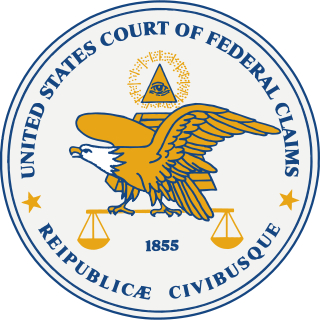
The United States Court of Federal Claims is a United States federal court that hears monetary claims against the U.S. government. It was established by statute in 1982 as the United States Claims Court, and took its current name in 1992. The court is the successor to trial division of the United States Court of Claims, which was established in 1855.
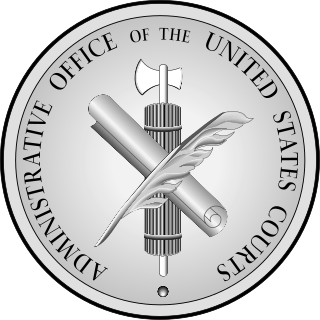
The Administrative Office of the United States Courts (AO) or the Administrative Office (AO) for short, is the administrative agency of the United States federal court system, established in 1939. The central support entity for the federal judicial branch, the AO provides a wide range of legislative, administrative, legal, financial, management, program, and information technology support services to the federal courts.
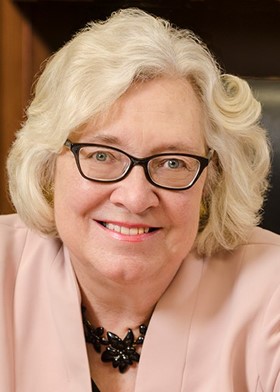
Julia Smith Gibbons is a United States circuit judge of the United States Court of Appeals for the Sixth Circuit.
In United States law, multidistrict litigation (MDL) refers to a special federal legal procedure designed to speed the process of handling complex cases, such as air disaster litigation or complex product liability suits.
Kiyemba v. Bush (Civil Action No. 05-cv-01509) is a petition for habeas corpus filed on behalf of Jamal Kiyemba, a Ugandan citizen formerly held in extrajudicial detention in the United States' Guantanamo Bay detention camps, in Cuba. Mr. Kiyemba is the next friend of each of the nine Uighur petitioners, Abdusabur, Abdusamad, Abdunasir, Hammad, Hudhaifa, Jalaal, Khalid, Saabir, and Saadiq, who seek the writ of habeas corpus through the petition
Lexecon Inc. v. Milberg Weiss Bershad Hynes & Lerach, 523 U.S. 26 (1998), was a United States Supreme Court case in which the Court unanimously held that a district court conducting coordinated pretrial proceedings in multiple cases by designation of the Judicial Panel on Multidistrict Litigation under 28 U.S.C. § 1407(a) has no authority to reassign a transferred case to itself for the actual trial of the case. The Court's decision overturned numerous lower-court decisions upholding what had become a common practice in multi-district cases.

Eldon E. Fallon is a United States district judge of the United States District Court for the Eastern District of Louisiana. Referred as a pioneer in the creative use of multidistrict litigations and bellwether trials, Fallon has overseen several high-profile multidistrict litigation cases in recent years, including the Xarelto, Chinese Drywall, Vioxx, and Propulsid litigations.
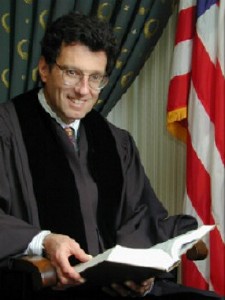
Daniel Aaron Polster is a senior United States district judge of the United States District Court for the Northern District of Ohio. Polster mediated a settlement between the city of Cleveland and the family of Tamir Rice, a 12-year-old black boy who was killed by a white police officer in 2014. In December 2017, a federal judicial panel selected Polster to preside over more than 3,000 consolidated prescription opioid-related lawsuits in multidistrict litigation known as the National Prescription Opiate Litigation. A trial for the litigation began in October 2021.
The 2010 DePuy Hip Replacement Recall was instituted when DePuy Orthopaedics, Inc., a division of Johnson and Johnson, recalled its ASR XL Acetabular metal-on-metal hip replacement system on August 24, 2010.

Robert Edwin Bacharach is a United States circuit judge of the United States Court of Appeals for the Tenth Circuit.

Vince Girdhari Chhabria is a United States district judge of the United States District Court for the Northern District of California and formerly a deputy city attorney at the San Francisco City Attorney's Office.
The Civil Justice Reform Act is a U.S. federal law enacted in 1990. It was the last major expansion of the Federal US Judiciary. Federal Judges in the United States have lifetime tenure and, although each district judge is marginally supervised by a chief judge, there was little national oversight of each judge's case management practices. Congress enacted CJRA in response to complaints of significant delays in the resolution of civil litigation in the federal courts; the CJRA was designed to encourage the speedy resolution of civil matters by requiring the Director of the Administrative Office of the United States Courts to prepare and publish a semi-annual report showing, by U.S. district judge and magistrate judge, all motions pending more than six months, all bench trials submitted more than six months, all bankruptcy appeals pending more than six months, all Social Security appeal cases pending more than six months, and all civil cases pending more than three years.

John Gilpin Heyburn II was a United States district judge of the United States District Court for the Western District of Kentucky. Heyburn served as the Chief Judge of the Court between 2001 and 2008.

Alan D Albright is a United States district judge of the United States District Court for the Western District of Texas. He was formerly a United States magistrate judge of the same court. Albright oversees a significant portion of patent litigation within the United States. In 2021, the United States Court of Appeals for the Federal Circuit repeatedly rebuked him in a string of opinions for failing to transfer cases to more apt jurisdictions. A quarter of all patent lawsuits in the US were once heard by Albright, who has been widely criticized for ignoring binding case law. However, following a docket-stripping order issued by Chief Judge Orlando Garcia, Albright's patent docket has declined precipitously.
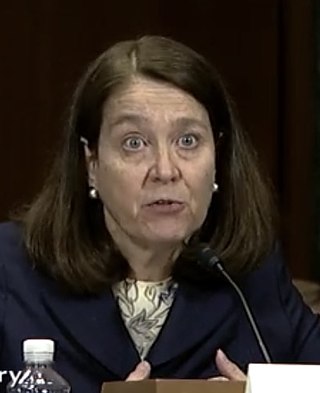
Mary Kay Vyskocil is a United States district judge of the United States District Court for the Southern District of New York and a former United States bankruptcy judge for the same court. President Donald Trump nominated her to the district bench in 2018 and again in 2019, and she was confirmed in 2019.

Eric David Miller is an American attorney and jurist serving as a United States circuit judge of the United States Court of Appeals for the Ninth Circuit.












